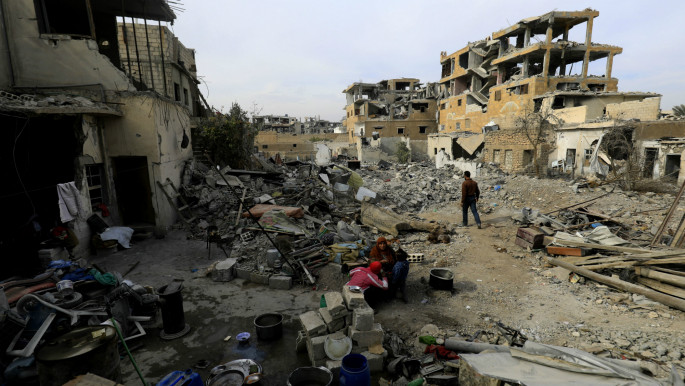Amnesty: US-led 'war of annihilation' in Raqqa killed hundreds of civilians
An international human rights group on Tuesday accused the US and its allies of showing little regard for civilians' lives while conducting a counter-extremist operation in the Syrian city that was once the de-facto capital of the Islamic State group.
Amnesty International said the US-led coalition's 2017 assault on Raqqa killed hundreds of civilians and reduced sections of the city to rubble.
Researchers for Amnesty interviewed more than 100 residents and visited 42 coalition targets in the city in a two-week period in February. They published their findings in a report titled "War of Annihilation," in a reference to the language used by US Defense Secretary Jim Mattis in the lead-up to the campaign.
"When so many civilians are killed in attack after attack, something is clearly wrong," said Donatella Rovera, one of the researchers who visited the city.
US Army Colonel Sean Ryan, spokesman for the coalition, called the assertions "grossly inaccurate". He said the coalition and allied Syrian forces organised safe passages for residents to flee, but IS militants trapped them inside to use as human shields.
"When you have an enemy that uses noncombatants as collateral damage, it's very difficult when you fight an enemy like that to completely avoid any casualties," Ryan said.
 |
If you rely on long-range tactics like artillery and airstrikes, then civilians are very likely to pay the price, and that appears to be what happened in Raqqa |  |
Benjamin Walsby, another investigator on the Amnesty team, said the coalition should have adjusted its strategy accordingly.
"If you rely on long-range tactics like artillery and airstrikes, then civilians are very likely to pay the price, and that appears to be what happened in Raqqa," he said.
The battle for Raqqa, once a city of 200,000 people, played out over four harrowing months in 2017, with the coalition playing a supporting role as the Kurdish-led Syrian Democratic Forces fought street by street.
The coalition unleashed wave after wave of airstrikes and shell fire until the last of the militants left Raqqa in October 2017.
When The Associated Press visited in April, it found Raqqa in ruins and its streets smelling of rotting bodies. Civil workers had pulled nearly 500 corpses from the rubble and were still finding more six months after the fighting.
Residents complained that the coalition bombing was indiscriminate and demanded compensation. According to the Raqqa Civil Council, which took over the administration of the city, 65 percent of homes had been destroyed.
IS militants booby-trapped the city, leaving streets and homes too dangerous for immediate reoccupation.
In its monthly casualty reports, the coalition has acknowledged responsibility for 32 civilian deaths in Raqqa between June and October, while saying it is still investigating open cases. Ryan, the coalition spokesman could not say whether officials were interviewing relatives of the deceased as part of their investigations.
Amnesty International's report says hundreds of civilians were killed, while the Airwars monitoring group says it has evidence of 1,400 fatalities.
Amnesty investigators called on the coalition to release strike data and details on the decision-making process behind target selection. They said the coalition rebuffed requests for information.
"It doesn't matter how precise your strikes are. They are only as precise as the information behind them, and if the information isn't right you're going to shoot at the wrong things," Walsby said, adding that a thorough investigation could build a case for a war crimes trial.
The Syrian war began when the Baath regime, in power since 1963 and led by President Bashar al-Assad, responded with military force to peaceful protests demanding democratic reforms.
This triggered an armed rebellion fuelled by mass defections from the Syrian army.
According to independent monitors, hundreds of thousands of civilians have been killed in the war, mostly by the regime and its powerful allies, and millions have been displaced both inside and outside of Syria.
The brutal tactics pursued mainly by the regime, which have included the use of chemical weapons, sieges, mass executions and torture against civilians have led to war crimes investigations.




